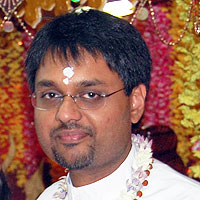Bhagavan Shiva in Shiva Puraan outlines the nine-fold devotion which consists of listening, eulogizing, remembering, serving, surrendering, worshipping, saluting, friendliness, and dedication.
in the age of Kali Yuga, devotion is easier to practise than knowledge and detachment. Lord Shiva promises that He will always assist a man endowed with devotion and will remove his obstacles.
- Shravanam: Listening
- Listening implies much more than hearing– there must be manan or attention and analysis.
- There must be continuous listening i.e. listen over and over again, and as one gradually changes one relates to new things.
- Listening to scriptures from the learned ones brings vivek or discrimination.
- Listening with love in the heart draws one closer to the Divine.
- Kirtanam: Praising or eulogizing
- The name of the Lord is greater than the form of the Lord.
- The use of music aids in this process. Music builds on fundamental vibration, called Spanda (Spanda Kaarikas).
- Everything is vibration, and using musical vibrations, we can go to the supreme state (Naad Yoga). E.g. String Theory, Nataraaj etc.
- Praising the Divine helps to bring the mind under control and allows individual consciousness to rise.
- By chanting the names of the Lord we activate the energy centres which move through the body.
- Smaranam: Remembering
- By having the Lord in the mind at all times a feeling of fearlessness fills the heart.
- In one’s daily life one should strive to constantly reflect upon the Divine. All-round success comes to whoever focuses continuously on the Lord.
- One’s fears are due to attachments (of loss and gain, and of abhinivesh or fear of death). Remembering the Lord removes these fears and one realizes one’s true nature, which is Divinity.
- Sevanam: Serving
- Service to humanity is service to God.
- Each individual must fulfil the five daily obligations to God, rishis, ancestors, man and lower forms of creation.
- True service is that which is rendered selflessly with mind, body and speech.
- If we see everyone and everything as a manifestation of the Divine, our service will indeed be service to God.
- Dasyam: Surrendering
- One should strive to become a servant of the Lord in mind, word and deed.
- The devotee that surrenders to the Divine follows the injunctions provided in our scriptures, avoids prohibitions, has firm conviction, believes and has full dependence on His Lord, and none other.
- An attitude of surrendering sets the master-servant relationship between the devotee and the Divine.
- Archanam: Worshipping
- In worship one offers oneself to the Lord.
- In doing puja and making the 16 offerings one burns away sins.
- In puja, ‘Bhuta-Shuddhi’ or purification of the elements (water, air, ether, earth and fire) takes place within.
- Vandanam: Saluting
- This can be done by meditating, repeating mantras, bowing and touching the ground.
- In offering salutations in this way, one develops humility.
- Touching the ground has internal benefits.
On the importance of the mantra “Om Namah Shivaya”
Panch-akashara mantra (five syllables) – Na Ma Shi Va Ya
| Syllable | Element | Chakra |
| Om | Sahasraar | |
| Om | Aagya | |
| Ya | Ether (spacious) | Vishuddha |
| Va | Air (invisible and gaseous) | Anahat |
| Shi | Fire (burning) | Manipur |
| Ma | Water (liquidity) | Swadhisthana |
| Na | Earth (solidity) | Muladhara |
- Saakhyam: Friendliness
- The Lord becomes the best of friends to His devotees.
- He takes care of one’s every need.
- Whatever is bestowed (good or bad) on the devotee will be in his best interest.
- Aatma Arpanam: Dedication
- Dedicating everything to the Lord and keeping nothing for oneself, i.e. complete self-surrender. This is the process of Sharanagati.
- In this process, the devotee frees himself from ego.
- He becomes an instrument of the Lord.
Bhagavan Shiva, in outlining the components of devotion to Sati, said that they are contributory to salvation. He said that true devotion is most endearing and the devotee becomes a favourite of His. He showers His grace and protection upon him.
One of the names of Bhagavan Shiva is ‘Ashutosh’ –He who is easily pleased. Each of us can become a favourite of the Lord by practising one or all of these modes of devotion with sincerity. The festival of Maha Shiva Raatri brings with it the opportunity to begin the practices of these nine components and please the Divine. Indeed, we can all be the Lord’s favourites!




Sunil.
Sits Ram. Very informative. Bahut Dhanyavaad. Can’t remember ever reading or hearing what the different syllables in the Panch-akashara mantra represents. Jai Shree Ram!
Sunil.
Oh, sorry. Slip of the finger. Sita Ram.